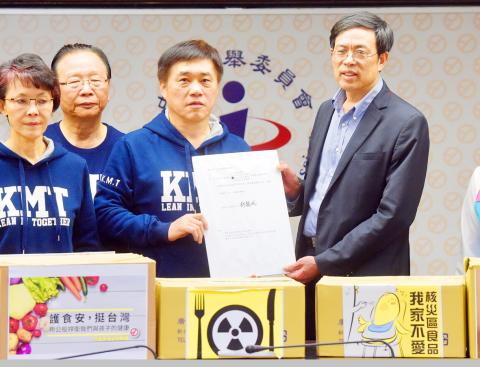Chinese Nationalist Party (KMT) Vice Chairman Hau Lung-bin (郝龍斌) yesterday turned over 18,750 signatures for a referendum drive to the Central Election Commission to back a call for a referendum on boycotting food imports from Fukushima Prefecture and four surrounding Japanese prefectures that were affected by the Fukushima Dai-ichi nuclear power plant disaster in 2011.
“The number of signatures is tenfold the legal requirement. It symbolizes the public outrage directed at the Democratic Progressive Party [DPP] administration,” Hau told a news conference at the commission’s office after presenting boxes containing the signed pages to commission official Chuang Kuo-hsiang (莊國祥).
Hau said that he was not against trade with Japan, but that he is against importing radiation-contaminated food products.

Photo: Huang Yao-cheng, Taipei Times
Hopefully, a referendum would help ban such products from entering Taiwan and safeguard public health, he said.
Several KMT lawmakers attended the news conference to express their support for the referendum drive.
Whether such imports should be allowed is an issue best decided by the voting public exercising their civil rights, making it an ideal referendum question, KMT caucus whip Lin Te-fu (林德福) said.
Quoting Minister of Health and Welfare Chen Shih-chung (陳時中), KMT Legislator Lai Shyh-bao (賴士葆) said that the Ministry of Health and Welfare might adjust its control mechanisms for Japanese food imports from location-based to product-based, indicating that it could be paving the way for lifting the ban on food imports from the five prefectures.
The commission should not intervene in the KMT’s referendum drive though the use of red tape, such as delaying it with a prolonged review, Lai said.
Amendments to the Referendum Act (公民投票法) last year lowered the threshold for referendum initiation from 0.005 percent of the electorate in the most recent presidential election, or about 90,000 people, to 0.0001 percent or about 1,800 people.
The proposal needs 280,000 signatures to be seconded.
During a question-and-answer session with KMT Legislator Wang Hui-mei (王惠美) yesterday, Council of Agriculture (COA) Minister Lin Tsung-hsien (林聰賢) said that he was against importing potentially radiation-contaminated food or lifting the import ban in exchange for Taiwan’s membership in the Comprehensive and Progressive Agreement for Trans-Pacific Partnership (CPTPP).
Negotiations with CPTPP member states should be based on the condition that the terms would be mutually beneficial, equal and reasonable, Lin said.
However, Taiwan would likely have to comply with “international norms” if it wants to secure membership in the trade agreement, so that it is on equal footing with the 11-member states, he said.
“If [the import of Japanese food-products from the five prefectures] is the international norm, can we resist that?” he said.
Saying that the public is concerned about the possibility of the ban being lifted, Wang urged the council to safeguard public health in any trade talks with Japan.

Alain Robert, known as the "French Spider-Man," praised Alex Honnold as exceptionally well-prepared after the US climber completed a free solo ascent of Taipei 101 yesterday. Robert said Honnold's ascent of the 508m-tall skyscraper in just more than one-and-a-half hours without using safety ropes or equipment was a remarkable achievement. "This is my life," he said in an interview conducted in French, adding that he liked the feeling of being "on the edge of danger." The 63-year-old Frenchman climbed Taipei 101 using ropes in December 2004, taking about four hours to reach the top. On a one-to-10 scale of difficulty, Robert said Taipei 101

A preclearance service to facilitate entry for people traveling to select airports in Japan would be available from Thursday next week to Feb. 25 at Taiwan Taoyuan International Airport, Taoyuan International Airport Corp (TIAC) said on Tuesday. The service was first made available to Taiwanese travelers throughout the winter vacation of 2024 and during the Lunar New Year holiday. In addition to flights to the Japanese cities of Hakodate, Asahikawa, Akita, Sendai, Niigata, Okayama, Takamatsu, Kumamoto and Kagoshima, the service would be available to travelers to Kobe and Oita. The service can be accessed by passengers of 15 flight routes operated by

Taiwanese and US defense groups are collaborating to introduce deployable, semi-autonomous manufacturing systems for drones and components in a boost to the nation’s supply chain resilience. Taiwan’s G-Tech Optroelectronics Corp subsidiary GTOC and the US’ Aerkomm Inc on Friday announced an agreement with fellow US-based Firestorm Lab to adopt the latter’s xCell, a technology featuring 3D printers fitted in 6.1m container units. The systems enable aerial platforms and parts to be produced in high volumes from dispersed nodes capable of rapid redeployment, to minimize the risk of enemy strikes and to meet field requirements, they said. Firestorm chief technology officer Ian Muceus said

MORE FALL: An investigation into one of Xi’s key cronies, part of a broader ‘anti-corruption’ drive, indicates that he might have a deep distrust in the military, an expert said China’s latest military purge underscores systemic risks in its shift from collective leadership to sole rule under Chinese President Xi Jinping (習近平), and could disrupt its chain of command and military capabilities, a national security official said yesterday. If decisionmaking within the Chinese Communist Party has become “irrational” under one-man rule, the Taiwan Strait and the regional situation must be approached with extreme caution, given unforeseen risks, they added. The anonymous official made the remarks as China’s Central Military Commission Vice Chairman Zhang Youxia (張又俠) and Joint Staff Department Chief of Staff Liu Zhenli (劉振立) were reportedly being investigated for suspected “serious